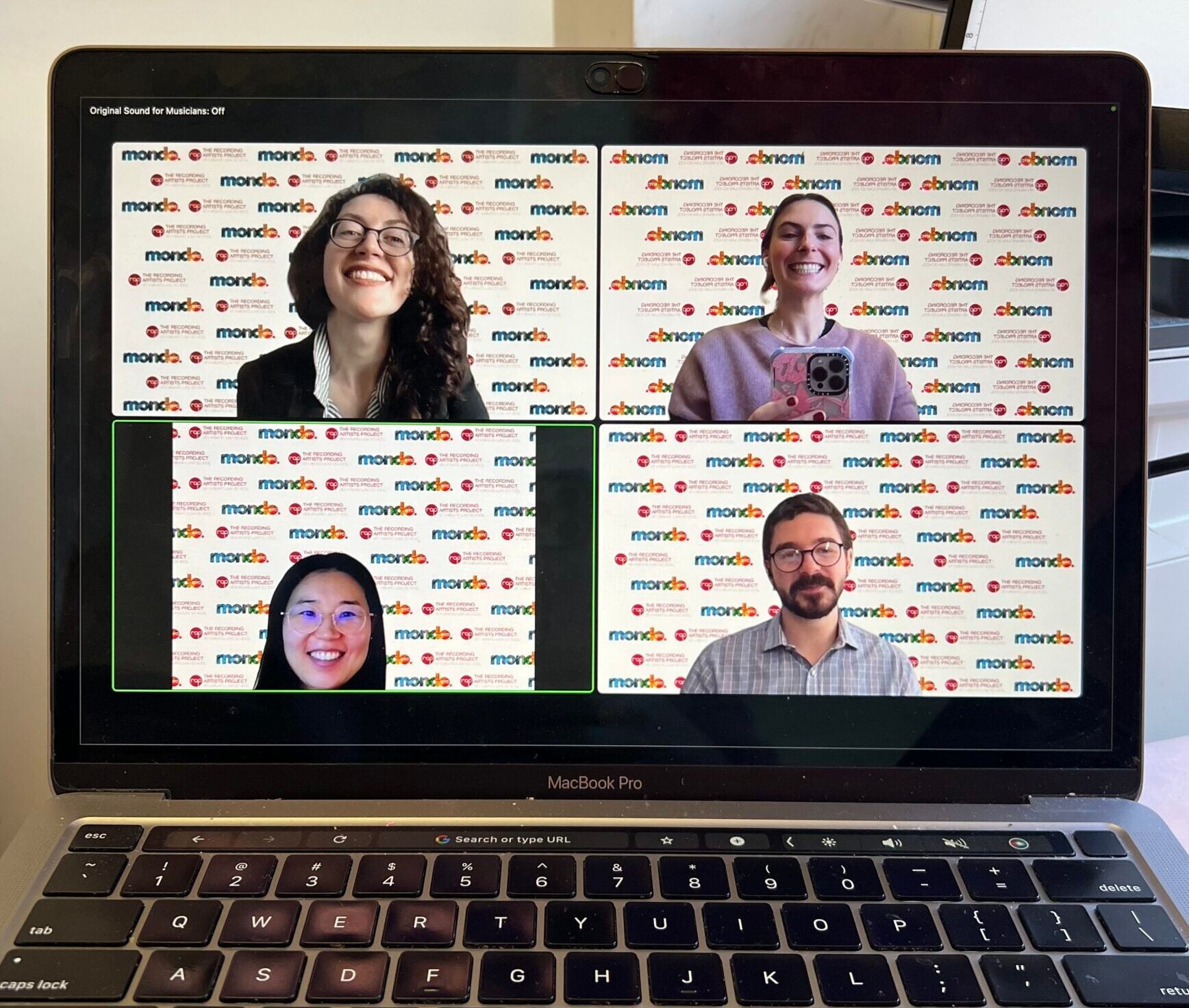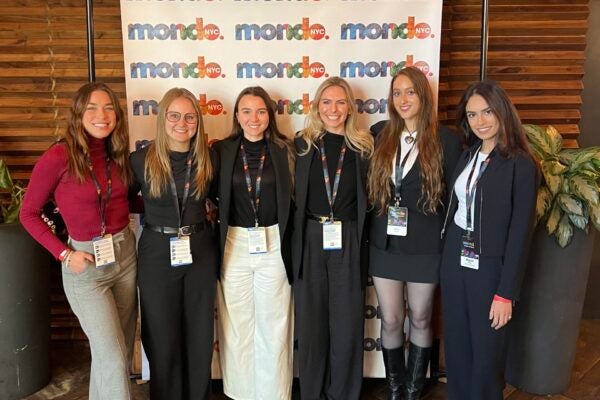For many students immersed in their day-to-day studies, music might color the background of their law school experience: lo-fi playlists during study sessions, concerts on the weekends, joining an acapella group or jazz ensemble. But for some Harvard Law students, music and entertainment are the purpose and center of their law school experience.
“Music law was a key factor that inspired me to pursue a legal education and choose Harvard Law School,” says Sabrina Ferrer ‘25, one such student. “The school provides unique opportunities to engage with the industry as a law student.”
This fall, Ferrer and several classmates headed down to New York City for an event at the intersection of legal education and the music industry: the Mondo.NYC Conference. The students are members of the Recording Artists Project, or RAP, a student practice organization consisting of over 175 students from Harvard Law and Berklee College of Music, serving musicians and other entertainment clients with pro bono legal assistance. At the conference, RAP students offered one-on-one pro bono consultations with up-and-coming musicians and attended panels, networking events, and performances.
Ferrer is co-president of RAP alongside Isabelle Pride ‘25. Having grown up in the musical theater world, Pride, too, came to Harvard Law with an interest in the intersection of entertainment and law.
“It was really important to me that wherever I went to law school, I would find a home for the arts and other people who were passionate about supporting artists. I’ve found that home through RAP,” Pride reflects. “I’ve grown so much from the ways that the organization has encouraged me to broaden my horizons, learn more about the industry, and imagine even more for myself in a legal career than I had envisioned going into law school.”
As co-presidents of RAP, Ferrer and Pride lead a community of students with a shared interest in learning the ins and outs of entertainment law to bring that knowledge to musicians. The organization welcomes students with no prior experience in entertainment who are looking to dive into a new area of the law, as well as students with diverse creative backgrounds and a desire to explore the legal aspects of the industry. During the semester, teams of students work with musician clients to help them protect their work, negotiate their contracts, and draft and review band agreements and record deals.
“A deep care for artists is at the center of what any entertainment lawyer does,” says Pride. “That passion for helping the client and wanting them to be everything they are as an artist informs the ethos that we try to bring to RAP.”
At Mondo, this ethos was brought to life on an even larger stage, Pride says: “Seeing lawyers attending the conference, speaking on panels, and taking eight hours out of their day to educate themselves in this niche area was so inspiring, and to know that’s the company we’ll be joining as lawyers in this field after law school is deeply inspiring. It’s something I want to infuse into everything that we do in RAP.”
Mondo was founded by executive producer Joanne Abbot Green nine years ago to bring together a global community of music, arts, and tech industry insiders and innovators for several days of events aiming to shed light on the current state of all facets of artist and songwriter career development and technology’s impact on it. At the conference, RAP students participated in pro bono legal consultation sessions, in addition to attending a day of panels and events.
“RAP advised Mondo participants on diverse legal issues including singer-songwriters looking for advice on how to navigate publishing and producer arrangements and signing their first management contracts, a band looking to document their relationship and joint ownership of their works, a songwriter on how to combat music fraud and better understand their rights in copyright infringement scenarios and a startup management company on internal agreements,” explains Carmen Halford, RAP’s supervising attorney, lecturer at law, and clinical instructor at the Transactional Law Clinics.

These sessions address varied legal needs, according to Pride. “We had people from ‘I’m producing music in my bedroom and don’t really even know where to start’ to established bands,” she says. “It presented such an amazing opportunity for our students to get exposed to perhaps a wider range of artists than they would in the normal course of the semester.”
“This immersive experience allowed our students to appreciate the profound role legal expertise plays in nurturing artistic talent,” Halford adds. “By participating in real-world consultations—whether unraveling copyright intricacies or interpreting internal agreements for budding management companies—they gained a deeper understanding of how dedicated legal support can be a catalyst for artistic innovation and industry success. Such experiences plant the seeds of passion and dedication in our future legal advocates.”
The students identify several common legal challenges facing emerging artists. “What really plagues new artists is ‘I don’t know what I don’t know,'” Pride explains. “So much of what you learn about the inner workings and the business side of the music industry, you learn on the fly.”
If she could impart one piece of advice to musicians starting their careers, Ferrer emphasizes the importance of proper documentation: “Get it in writing.”
Sample clearance represents a particular concern, according to Ferrer. “Before they sample or take any bit, piece, chunk of music from any other website, AI platform, any recording that you find on any medium, make sure that you clear those rights,” she advises. “The music industry is the place where you would rather ask for permission than seek forgiveness. You’ll be paying cents or dollars now, but if you blow up, it’s going to be millions of dollars.”
Anj Fink ‘26, RAP’s Event’s Director, underscores the passion RAP students have for imparting these crucial tips onto their clients: “For those of us who grew up around creatives, worked with creatives, or are creatives ourselves, there was a time in our lives where we similarly didn’t know all the legal issues that could arise. So, getting to sit in these shoes now as a future lawyer has been so rewarding, having the ability to make a difference in even one artist’s life and career.”
At the end of the week, the RAP cohort attended a full day of Mondo panels on current industry issues—of which there are many, particularly during the advent of generative artificial intelligence. Ferrer describes some key topics covered: “We sat in on panels on copyright and new cases that have come down from the Supreme Court or that are pending review, and how they might influence music law. Another panel focused on the securitization of music and creating funds—trying to see the overlap of how music is being used as a cutting-edge monetization platform for funds.”
For Fink, the experience points to broader industry dynamics. “There’s a rich community of people who are so passionate about music and music law and are willing to put in all of this work and effort,” she says, reflecting on the program’s connection to continuing legal education requirements. “I’m taking in everything and feeling enthralled with all that makes this industry so complex and ever-changing. Knowing this opportunity exists for us when we’re lawyers and need these CLE credits ourselves is incredible and further shows how expansive and dedicated this community truly is. I just could not be more excited to join them one day.”
Mondo is equally pleased to have Harvard Law students in the room, says founder Joanne Abbot Green: “The success of our multi-year relationship with RAP highlights two of Mondo’s priorities: providing real world access and solutions to emerging artists, their representatives and rights holders; and enabling music professionals at the outset of their careers the opportunity to get up close and personal with industry leaders from both legacy companies and startups in the legal, finance and technology arenas. RAP is unique in that it provides world-class expertise—with the backing of an iconic institution like Harvard Law School—to individuals that would never have access to this level of intellectual capital otherwise. Mondo could not be prouder bringing these two very different groups together to their mutual benefit.”
Until next year’s Mondo conference, RAP students will keep serving musicians and hosting events on campus for the community of entertainment-focused students.
“The plethora of issues that are tied into music law make RAP such a unique and special offering at this school, and it’s amazing to see more students get connected to us,” reflects Ferrer. “It’s an unparalleled organization.”
Filed in: Clinical Spotlight
Tags: Class of 2025, Class of 2026, Recording Artists Project
